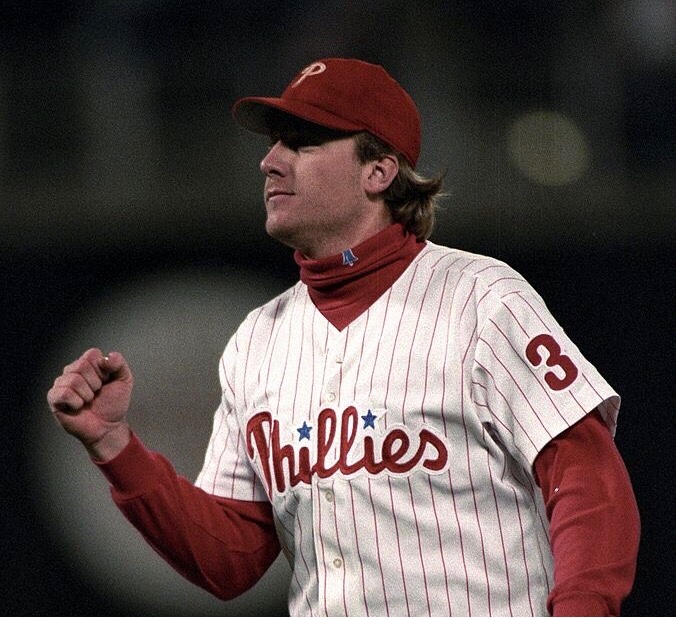The Case for Curt Schilling's Induction in the Hall of Fame

October 21, 1993, my seats were high up in the 700 level of Veterans' Stadium. I had to strain my neck to look behind me if I wanted to see the replay on Phanavision. Of course, it didn't matter. Nor did I mind that no one actually sat during the entire three hour contest. It was game five of the World Series. The night before the Phillies had just blown a five run lead to fall behind the Blue Jays three games to one. The Phillies play-off life was in the balance. To the mound, Manager Jim Fregosi sent Curt Schilling.
Schilling had been named Most Valuable Player of the NLCS, despite not earning a single win in the series. Instead, he went eight innings in both games he pitched, giving up only two runs. Yielding the mound to the Wild Thing, Mitch Williams, Schilling watched from the dugout, towel over his head, as the closer blew both saves. His 1.69 ERA was still enough for Schilling to win the MVP.
As Schilling took the mound, we the fans knew that he was determined to see it through and keep the Phils alive. Indeed, even from the rafters of the Vet, it looked as if Schilling threw harder as the game wore on. In the end, Schilling and the Phillies emerged victorious, with a 2-0 complete game shut-out.
Although the Phillies lost the 1993 Series, Schilling became no stranger to post season heroics. In 2001, Schilling, this time pitching for the Arizona Diamondbacks, started three games against the Yankees, one on three days' rest. In 21 1/3 innings pitched, Schilling posted a 1.69 ERA, with 26 strikeouts. He shared the Series' MVP Award with the other overachieving pitcher from Arizona, Randy Johnson.
And of course, who could forget the bloody sock performance of 2004? After falling behind three games to none against the Yankees in the ALCS, the Red Sox roared back. Schilling, suffering from and ankle injury, had his tendon sewn before starting game six. He pitched seven innings, giving up one run and sporting a sock soaked with his blood. The Red Sox went on to beat the Yankees in four straight and then broke the Curse of the Bambino by winning the World Series.
In total, Schilling pitched in five post seasons, winning 11 games and losing two. In 133 1/3 innings, he struck out 120 and posted an ERA of 2.23.
Post season performance, however, does not win a pitcher a spot in Cooperstown. Consistent performance over a long career does.
But even examining Schilling's long career, his numbers demonstrate that he is Hall of Fame worthy. Posting 3,000 strikeouts over a pitching career should be sufficient to earn a player a plaque in Cooperstown. And indeed every pitcher who has reached that plateau is enshrined in the Hall of Fame. All but one: Curt Schilling. In fact, Schilling's 3,116 strikeouts is more than the 3,084 posted by John Smoltz, who was inducted in 2015.
One knock against Schilling has been that he only won 216 games over his twenty year career. But plenty of quality pitchers in the Hall of Fame have fewer wins. Schilling has Smoltz beat by three games. Athletics great Charles Albert "Chief" Bender has only 212 wins; Don Drysdale 209. And Rube Waddel didn't even crack 200, ending his career with 193 wins.
Schilling's 3.46 lifetime ERA is just under Robin Robert's ERA of 3.41 and better than Tom Glavine's ERA of 3.54.
The real knock against Schilling has been his outspoken conservative politics. In particular, Schilling has not been afraid to speak out about radical Islamic terrorism. With the Baseball Writers of America, the pool of voters for Hall of Fame induction, stacked with liberal thinkers, the voters have held Schilling's politics against him.
This is despite the the fact that one of the worst racists, Cap Anson, who is credited with keeping African Americans out of the major leagues for decades, not only is enshrined in the Hall, but is championed as one of the pioneers of nineteenth century baseball. Indeed, Hall of Famer Steve Carlton has infamously claimed that the world is ruled by 12 Jewish bankers in Switzerland.
The point is is that personality and politics should not drive Hall of Fame induction. If they did, surely Ty Cobb would have been excluded. It's on the field performance that matters. And in this regard, Schilling has proven himself worthy, both in the regular season and in the play-offs.
By: William J. Kovatch, Jr.

Comments
Post a Comment